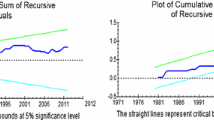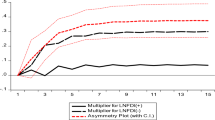Abstract
This paper deals with the empirical investigation of causal relationship between financial deepening, economic growth and poverty reduction using quarter frequency data in case of Pakistan over the period of 1972–2011. We applied the autoregressive distributed lag model bounds testing approach by incorporating structural breaks stemming in the series. The order of integration of the variables is examined by applying structural break unit root test. Our empirical exercise indicated that the long run relationship between financial deepening, economic growth and poverty reduction exists in case of Pakistan. The causality analysis implied that causality results are sensitive with the use of proxy for poverty reduction.



Similar content being viewed by others
Notes
Pakistan was also declared Asian Tiger by Shoukat Aziz.
The sample countries are Australia, Austria,Belgium, Bolivia, Brazil, Central African Republic, Canada, Chile, Colombia, Costa Rica,Germany, Denmark, Dominican Republic, Algeria, Ecuador, Spain, Finland, France, United Kingdom, Ghana, Gambia, Greece, Guatemala, Honduras, Indonesia, India, Ireland, Iran, Israel,Italy, Jamaica, Japan, Kenya, Republic of Korea, Sri Lanka, Lesotho, Mexico, Mauritius, Malawi, Malaysia, Niger, Netherlands, Norway, Nepal, New Zealand, Pakistan, Panama, Peru,Philippines, Portugal, Paraguay, Rwanda, Sudan, Senegal, Sierra Leone, El Salvador, Sweden,Thailand, Trinidad and Tobago, United States, Venezuela, South Africa and Zimbabwe.
Shahbaz and Islam (2011) proved that income inequality narrowing hypothesis works in Pakistan.
Australia, Burundi, Burkina Faso, Bangladesh, Bulgaria, Bahamas, The Bolivia, Brazil, Botswana, Canada, Chile, Cote d’Ivoire, Cameroon, Colombia, Costa Rica, Germany, Denmark, Dominican Republic, Algeria, Ecuador, Egypt, Arab Rep. Spain, Ethiopia, Finland, France, United Kingdom, Ghana, Gambia, Greece, Guatemala, Guyana, Hong Kong, China, Honduras, Croatia, Hungary, Indonesia, India, Jamaica, Japan, Kenya, Korea, Rep. Lao PDR, Sri Lanka, Lesotho, Morocco, Madagascar, Mexico, Mali, Mongolia, Mauritania, Malaysia, Niger, Nigeria, Nicaragua, Netherlands, Norway, Pakistan, Panama, Peru, Philippines, Poland, Portugal, Paraguay, Romania, Senegal, Singapore, Sierra Leone, El Salvador, Slovenia, Sweden, Thailand, Trinidad and Tobago, Tunisia, Turkey, Uganda, Uruguay, United States, Venezuela, Vietnam, South Africa, Zambia.
Barbados, Burkina Faso, Burundi, Colombia, Costa Rica, Cote d’Ivoire, Dominican Republic, Ecuador, El Salvador, Caribbean Gabon, Gambia, Ghana, Guatemala, Honduras, India, Jamaica, Kenya, Madagascar, Malaysia, Mexico, Nepal, Niger, Nigeria, Pakistan, Panama, Paraguay, Philippines, Rwanda, Senegal, Sierra Leone, South Africa, Sri Lanka, Thailand, Trinidad and Tobago and Venezuela.
We used model-4 for empirical estimations following Sen (2003).
The structural breaks are based on Zivot and Andrews (1992).
For more details see (Shahbaz 2010).
References
Ang, J.B., Mckibbin, W.J.: Financial liberalization, financial sector development and economic growth: evidence from Malaysia. J. Dev. Econ. 84, 215–233 (2007)
Apergis, N., Filippidis, I., Economidou, C.: Financial deepening and economic growth linkages: a panel data analysis. Rev. World Econ. 143, 179–198 (2007)
Bandiera, O., Caprio, G., Honohan, P., Schiantarelli, F.: Does financial reforms raise or reduce savings? Rev. Econ. Stat. 82, 239–263 (2000)
Beck, T., Demirgüç-Kunt, A., Levine, R.: Finance, inequality and the poor. J. Econ. Growth 12, 27–49 (2007)
Demetriades, P.O., Hussein, K.A.: Does financial development cause economic growth? Time-series evidence from sixteen countries. J. Dev. Econ. 51, 387–411 (1996)
Dickey, D.A., and Fuller W.A.: Distribution of the estimators for autoregressive time series with a unit root. J. Am. Stat. Assoc. 74, 427–431 (1979)
Dickey, D.A., and Fuller, W.A.: Distribution of the estimators for autoregressive time series with a unit root. Econometrica 49, 1057–1072 (1981)
Ellahi, N.: How development of finance contribute to poverty alleviation and growth: a time series application for Pakistan. Afr. J. Business Manag. 6, 12138–12143 (2011)
Elliott, G., Rothenberg, T., and Stock, J.: Efficient tests for an autoregressive unit root. Econom. 64, 813–836 (1996)
Fowowe, B., Abidoye, B.: A Quantitative Assessment of the Effect of Financial Development on Poverty in African Countries. Department of Economics, University of Ibadan, Nigeria (2012)
Geda, A., Shimeles, A., Zerfu., D.: Finance and poverty in Ethiopia: a household level analysis. UNU-WIDER, Research Paper No. 2006/51 (2006)
Granger, C.W.J.: Investigating Causal Relations by econometric models and cross-spectral methods, Econom. 37(3), 424–438 (1969)
Ho, S.-Y., Odhiambo, M.N.: Finance and poverty reduction in China: an empirical investigation. Int. Business Econ. Res. J. 10, 103–114 (2011)
Honohan, P.: Financial development, growth and poverty: how close are the links? In: Goodhart, C. (ed.) Financial Development and Economic Growth: Explaining the Links, pp. 1–37. Palgrave Macmillan, Basingstoke (2004)
Hye, Q.M.A.: Financial development index and economic growth: empirical evidence from India. J. Risk Finance 12, 98–111 (2011)
Inoue, T., Hamori, S.: How has financial deepening affected poverty reduction in India? Empirical analysis using state-level panel data. Appl. Financial Econ. 22, 395–403 (2012)
Jalil, A., Feridun, M.: Impact of financial development on economic growth: empirical evidence from Pakistan. J. Asia Pac. Econ. 16, 71–80 (2011)
Jalilian, H., Kirkpatrick, C.: Financial development and poverty reduction in developing countries. Int. J. Finance Econ. 7, 97–108 (2002)
Jalilian, H., Kirkpatrick, C.: Does financial development contribute to poverty reduction? J. Dev. Stud. 41, 636–656 (2005)
Jamal, H.: Does inequality matter for poverty reduction. Research Report, 58. Social Poverty and Development Center, Karachi, Pakistan (2005)
Jeanneney, S.G., Kpodar, K.: Financial development and poverty reduction: can there be a benefit without a cost? IMF Working Paper No. WP/08/62, International Financial Statistics, Washington DC (2008)
Kar, M., Agir, H., Peker, O.: Financial Development and Poverty Reduction in Turkey. Department of Economics, Çukurova University, Adana (2011)
Kelly, R., Mavrotas, G.: Financial sector development-futile or fruitful? An examination of the determinants of savings in Sri Lanka. WIDER Discussion Paper No. 14, United Nations University (2003)
Khan, A.D., Ahmad, I., Jan, W.U.: Financial Development and Poverty Alleviation: Time Series Evidence from Pakistan. World Applied Sciences Journal 18, 1576–1581 (2012)
Khan, M.A., Qayyum, A.: Trade, financial and growth nexus in Pakistan. Econ. Anal. Work. Pap. 6, 1–25 (2007)
Kirkpatrick, C.: Financial development, economic growth and poverty reduction. Pak. Dev. Rev. 39, 363–388 (2000)
Kwiatkowski, D., Phillips, P.C.B., Schmidt, P., Shin, Y.: Testing the null hypothesis of stationarity against the alternative of a unit root: how sure are we that economic time series have a unit root? J. Econom. 54, 159–178 (1992)
Luintel, R., Khan, M.: A quantitative re-assessment of the finance-growth nexus: evidence from a multivariate VAR. Journal of Development Economics 60, 381–405 (1999)
Lütkepohl, H.: Structural vector autoregressive analysis for cointegrated variables. AStA Adv. Stat. Anal. 90, 75–88 (2006)
Narayan, P.K.: The saving and investment nexus for China: evidence from cointegration tests, App. Econom. 17, 1979–1990 (2005)
Ng, S., and Perron, P.: Lag length selection and the construction of unit root tests with good size and Power. Econom. 69(6), 1519–1554 (2001)
Odhiambo, M.N.: Finance-growth-poverty nexus in South Africa: a dynamic causality linkages. J. Socio-Econ. 38, 320–325 (2009)
Odhiambo, M.N.: Is financial development a spur to poverty reduction? Kenya’s experience. J. Econ. Stud. 37, 343–353 (2010a)
Odhiambo, M.N.: Financial deepening and poverty reduction in Zambia: an empirical investigation. Int. J. Soc. Econ. 37, 41–53 (2010b)
Perez-Moren, S.: Financial development and poverty in developing countries: a causal analysis. Empir. Econ. 41(1), 57–80 (2012)
Phillips, P.C.B., and Perron, P.: Testing for a unit root in time series regression. Biometrika 75(2), 335–346 (1988)
Pesaran, M.H., Shin, Y.: An autoregressive distributed-led modeling approach to cointegration analysis. In Steinar Strom. (ed.) Econometrics and economic theory in the 20th century. The Ragnar Frisch Centennial Symposium, Cambridge: Cambridge University Press (1999)
Pesaran, M.H., Shin, Y., Smith, R.: Bound Testing Approaches to the Analysis of Level Relationships, J. Appl. Econom. 16, 289–326 (2001)
Pradhan, R.P.: The nexus between finance, growth and poverty in India: the cointegration and causality approach. Asian Soc. Sci. 6, 114–122 (2010)
Quartey, P.: Financial sector development, savings mobilisation and poverty reduction in Ghana. UNU-WIDER 2005, Research Paper No. 2005/71, United Nations University, Helsinki, Finland (2005).
Rahman, M.Z., Salahuddin, M.: The determinants of economic growth in Pakistan: does stock market development paly a major role? Economic Issues 15, 69–86 (2010)
Sen, A.: Limiting behavior of Dickey-Fuller t-tests under the crash model alternative. Econometrics. J. Royal Econom. Soc. 6(2), 421–442 (2003)
Shahbaz, M.: A reassessment of finance-growth nexus for Pakistan: under the investigation of FMOLS and DOLS techniques. J. Appl. Econ. 1, 65–80 (2009a)
Shahbaz, M.: Financial performance and earnings of poor people: a case study of Pakistan. J Yasar University 4, 2557–2572 (2009b)
Shahbaz, M.: Income inequality-economic growth and non-linearity: a case of Pakistan. Int. J. Soc. Econ. 37, 613–736 (2010)
Shahbaz, M.: Does trade openness affect long run growth? cointegration, causality and forecast error variance decomposition tests for Pakistan. Econ. Model. 29, 2325–2339 (2012)
Shahbaz, M., Islam, F.: Financial development and income inequality in Pakistan: an application of ARDL approach. J. Econ. Dev. 36, 35–58 (2011)
Tahir, M.: An investigation of the effectiveness of financial development in Pakistan. Lahore J. Econ. 13, 27–44 (2008)
Uddin, G.S., Kyophilavong, P., Sydee, N.: The causal nexus between financial sector development and poverty reduction in Bangladesh. Int. J. Econ. Financial Issues 2, 304–311 (2012)
Zivot, E., Andrews, D.: Further evidence of great crash, the oil price shock and unit root hypothesis. J. Bus. Econ. Stat. 10, 251–270 (1992)
Author information
Authors and Affiliations
Corresponding author
Rights and permissions
About this article
Cite this article
Rehman, I.U., Shahbaz, M. Multivariate-based Granger causality between financial deepening and poverty: the case of Pakistan. Qual Quant 48, 3221–3241 (2014). https://doi.org/10.1007/s11135-013-9952-z
Published:
Issue Date:
DOI: https://doi.org/10.1007/s11135-013-9952-z




